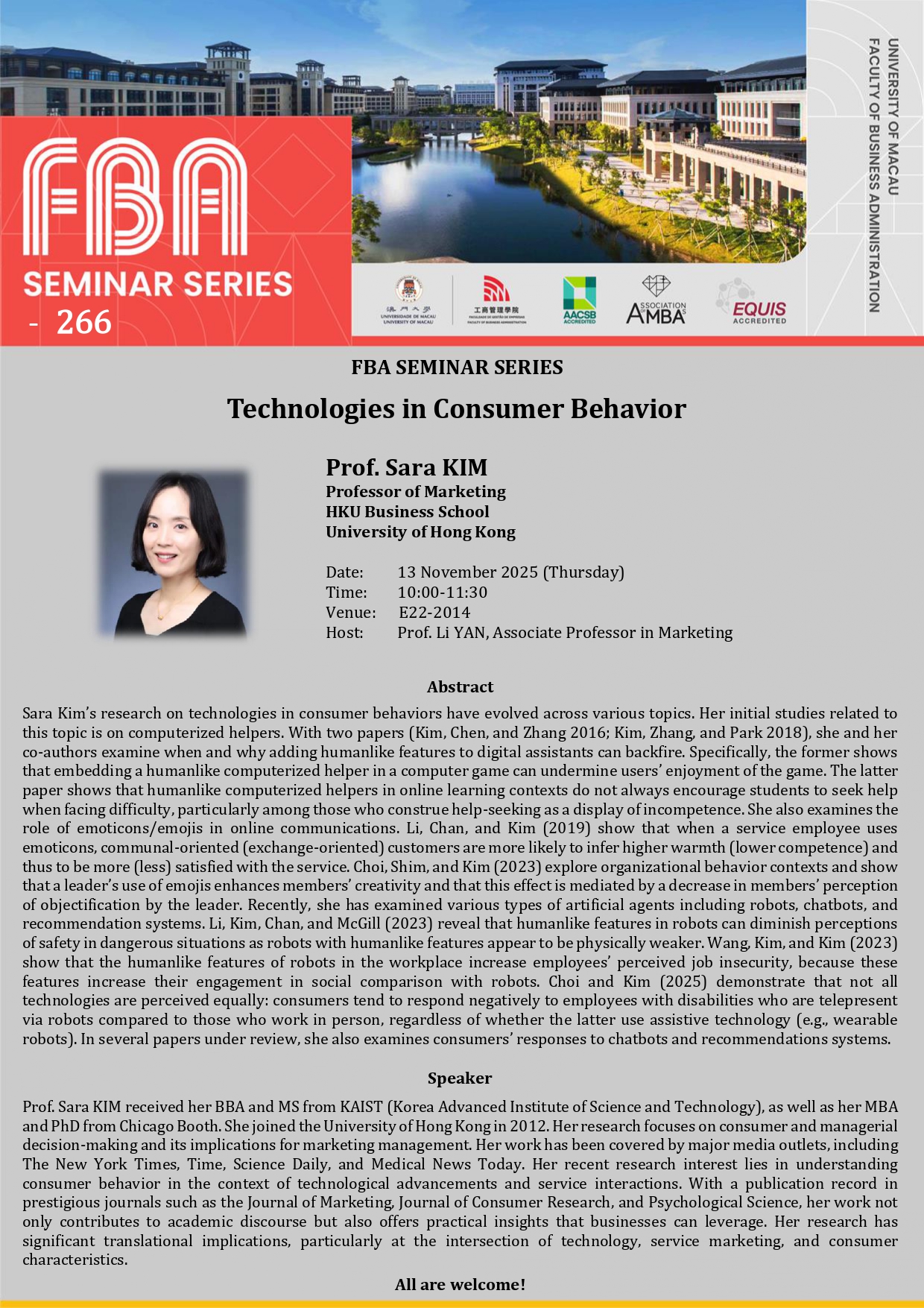Technologies in Consumer Behavior
Prof. Sara KIM
Professor of Marketing
HKU Business School
University of Hong Kong
Date: 13 November 2025 (Thursday)
Time: 10:00-11:30
Venue: E22-2014
Host: Prof. Li YAN, Associate Professor in Marketing
Abstract
Sara Kim’s research on technologies in consumer behaviors have evolved across various topics. Her initial studies related to this topic is on computerized helpers. With two papers (Kim, Chen, and Zhang 2016; Kim, Zhang, and Park 2018), she and her co-authors examine when and why adding humanlike features to digital assistants can backfire. Specifically, the former shows that embedding a humanlike computerized helper in a computer game can undermine users’ enjoyment of the game. The latter paper shows that humanlike computerized helpers in online learning contexts do not always encourage students to seek help when facing difficulty, particularly among those who construe help-seeking as a display of incompetence. She also examines the role of emoticons/emojis in online communications. Li, Chan, and Kim (2019) show that when a service employee uses emoticons, communal-oriented (exchange-oriented) customers are more likely to infer higher warmth (lower competence) and thus to be more (less) satisfied with the service. Choi, Shim, and Kim (2023) explore organizational behavior contexts and show that a leader’s use of emojis enhances members’ creativity and that this effect is mediated by a decrease in members’ perception of objectification by the leader. Recently, she has examined various types of artificial agents including robots, chatbots, and recommendation systems. Li, Kim, Chan, and McGill (2023) reveal that humanlike features in robots can diminish perceptions of safety in dangerous situations as robots with humanlike features appear to be physically weaker. Wang, Kim, and Kim (2023) show that the humanlike features of robots in the workplace increase employees’ perceived job insecurity, because these features increase their engagement in social comparison with robots. Choi and Kim (2025) demonstrate that not all technologies are perceived equally: consumers tend to respond negatively to employees with disabilities who are telepresent via robots compared to those who work in person, regardless of whether the latter use assistive technology (e.g., wearable robots). In several papers under review, she also examines consumers’ responses to chatbots and recommendations systems.
Speaker
Prof. Sara KIM received her BBA and MS from KAIST (Korea Advanced Institute of Science and Technology), as well as her MBA and PhD from Chicago Booth. She joined the University of Hong Kong in 2012. Her research focuses on consumer and managerial decision-making and its implications for marketing management. Her work has been covered by major media outlets, including The New York Times, Time, Science Daily, and Medical News Today. Her recent research interest lies in understanding consumer behavior in the context of technological advancements and service interactions. With a publication record in prestigious journals such as the Journal of Marketing, Journal of Consumer Research, and Psychological Science, her work not only contributes to academic discourse but also offers practical insights that businesses can leverage. Her research has significant translational implications, particularly at the intersection of technology, service marketing, and consumer characteristics.
All are welcome!


